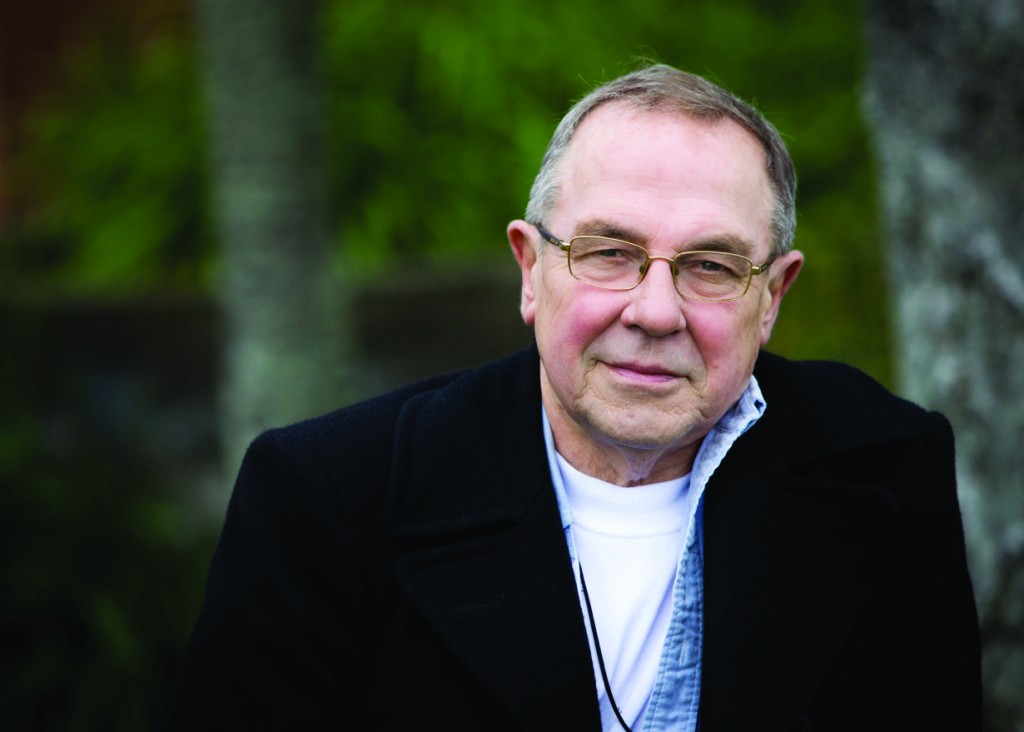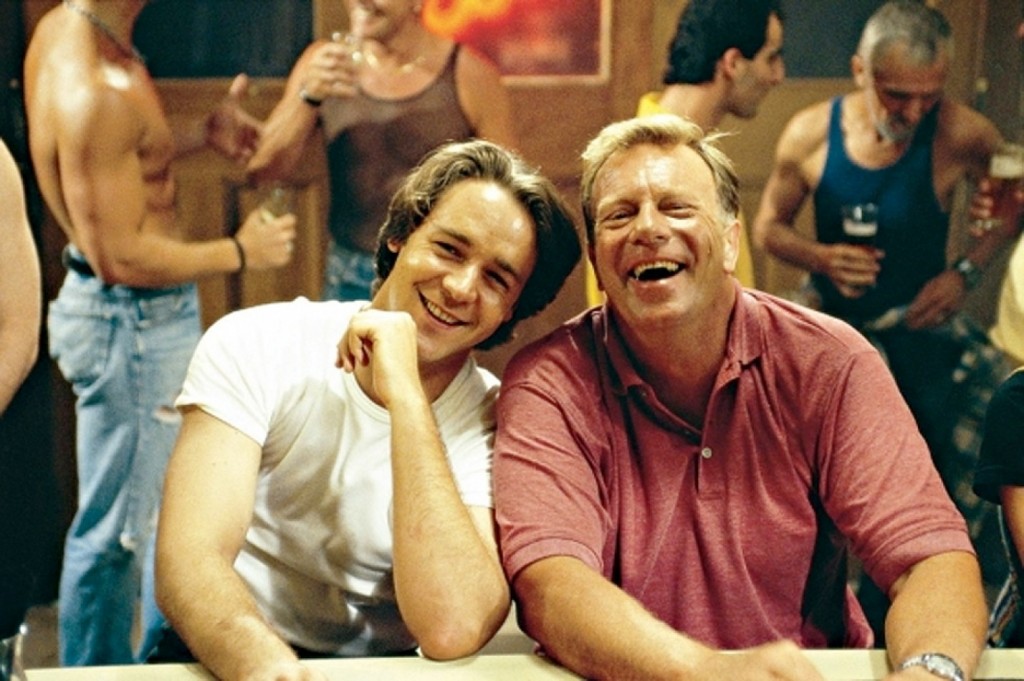‘The Sum Of Us’ writer David Stevens on the play’s 25-year influence

Since it debuted some 25 years ago, Australian playwright David Stevens’ The Sum Of Us has become a much-loved gay classic, spawning a hit 1994 film starring Russell Crowe and numerous re-stagings. Now, the charming comedy-drama about the close relationship between a widowed man and his adult gay son come to the London stage, playing at the Above The Stag Theatre from September 9. Here, David Stevens talks about the play that’s still finding new audiences, a generation after he first wrote it.

What inspired you to write The Sum of Us?
My homosexuality was no secret in Melbourne, especially at Crawford Productions where I worked. The film crews’ nickname for me was “Sailor”. I was becoming a bit bolshie about two things: that homosexuality was still illegal in Victoria, and conversely that to be gay meant you were expected to behave in a certain way, and I didn’t.
I’d just finished writing a TV script and had fallen in love with the characters, and, knowing they’d soon no longer be “mine” I got quite morose and spent the night sitting in the garden getting drunk.
A memory came to me of an obviously upset woman I’d seen on a train, and I went to my desk and wrote that story. When I looked at it the next day – sober – I liked it. Then another memory came to me. When I was about 21, around 1960, I picked up a cheerful, chipper young Cockney, who took me back to his house in the East End. He warned me to be quiet because his mum was already in bed.
So we had muted, but excellent, sex and I fell asleep in his arms. In the morning, there was a tap on the door and his mum put her head in and asked me if I took sugar in my tea.
He left for work, but his mum cooked me breakfast and told me she hoped I would see her son again because what she wanted for him, more than anything in the world, was that he find himself a friend and not be lonely.
So loneliness became a theme and I understood that I wanted to write a play. The Cockney mum was the springboard for my Dad/Son relationship, and the “woman on the train” speech, which is all about potential loneliness, became the end of Act One.
Is any of it autobiographical?
Well I’m not a young, football playing Aussie plumber, and my relationship with my father was opposite to the one in the play. But aspects are. I believe, as much as I believe anything, that I was born queer – I had zero choice in the matter.
The fact that my widowed Grandmother – a lusty woman – found another young woman and they shared their lives together for forty years resonated with me. What resonated even more – what made me angry – was their forced separation when they were old. They were taken to different places to die.
So Gran’s story seemed to have a crucial place in my play. One of the saddest things of our lives is that we have been robbed of our history. Countless numbers of the dead would have tales to tell, but they were never allowed, often by other family members, to tell those stories.

What was the response to the openly gay character in Australia in the early 1990s, and to the father’s total acceptance of him?
Generally, the reaction was profoundly positive. When the movie came one noted Australian critic announced that it was “preaching to the choir” – he thought Australia was already far advanced in gay acceptance than my play and film suggested. Looking at Australia’s retrogressive attitude to marriage equality, I can only say “yeah, right.”
A wonderful thing happened on the third or fourth night of the first production in LA. A young man came to me and said he was going to bring his parents to see it as his way of coming out to them – and, if they wanted, would I meet them afterwards? They came the next week. His mother was in tears and thanked me fulsomely. His father stood apart, not saying anything, but then came and shook my hand and said “thank you, for what you have done for me – and my son.”
This happened a lot. Any number of young men – and some women – brought their parents to the play as their way of coming out.
You touch on AIDS in the play in a lovely way with the father trying to inform his son on the issue through porn literature. What made you not tackle this issue on a bigger level?
I have lost so many of my dearest friends, the people with whom I had expected to grow old. I miss some of them so much it hurts. I don’t have Survivor Guilt but I certainly have Survivor Sadness.
But I didn’t went the play to be about AIDS. If anything, I wanted it to be in spite of AIDS. We still lived our lives, we still fucked, we still loved and were loved.
It reinforces an underlying theme of mine – we don’t go away. Had Hitler conquered the world it’s theoretically possible for him to have wiped out all the Jews, but even if he had been able to wipe out all the homosexuals, with the next round of babies born we would be there. We don’t go away.
How did the film of the play come about?
The film rights were sold at the same time as the play was sold to New York, to the same producers. I didn’t want to adapt it – I thought it needed another pair of eyes for the cinema – but it was part of the contract. I changed the wayy Joyce finds out about Jeff – instead of discovering the gay magazines I had Dad take her to pub to introduce her to that world – but the director wanted it as it was in the play.
Speaking of Joyce, she’s often been seen as the villain of the piece and thus the play as “anti-woman”. But I cannot subscribe to the idea that no women are homophobic, and to me Joyce’s reasons are crystal clear. Dad kept an important truth from her, so how can she trust him?

The Sum of Us is part of a trilogy. What links the plays, and how closely?
It’s three moments in Australian time, seeing our history from a different, revisionist perspective – of minorities, the dispossessed. I was appalled that the recent British TV series Banished [about convicts in a penal colony in 1788] shows Australian history as an entirely white, heterosexual experience. There are no other voices in a series so concerned with sex, love and loneliness. No one involved with Banished seemed to know that Sydney was then called “the Sodom of the South Seas” or, if they did know, were determined not acknowledge it. There were a number of Jews on the First Fleet, and also a couple of blacks, but there’s not a sign of them in Banished, nor any Aboriginals.
So the first play in my trilogy is about a Jew and a black, both ex-convicts. The black became quite famous in Sydney – Blue’s Point in Sydney is named after him. The hero of the second play is white, male and heterosexual – but he is dreadfully disfigured by a bush fire. It is, of course, a comedy.
How do you think issues around homophobia and the status of gay people have changed since 1990 when you wrote the play?
Oh, mate, I don’t know. I am a child of my times. I have lived my life as openly queer and it has been a fabulous ride. I have encountered homophobia, sometimes dramatically so, but I can only be offended if I choose to be offended – and I don’t. I’ve lost work because of it, and my reaction has been to shrug. I don’t want to work with people who can’t accept me for what I am.
I am appalled at the present state of play regarding same-sex marriage in Australia. We have marriage equality in New Zealand, and the sky hasn’t fallen because of it.
Me? I don’t want to get married, although my partner wouldn’t mind. I prefer being that child of my times that I am, a somewhat subversive queer.
info: The Sum Of Us plays at the Above The Stag Theatre, Vauxhall, from September 9.
